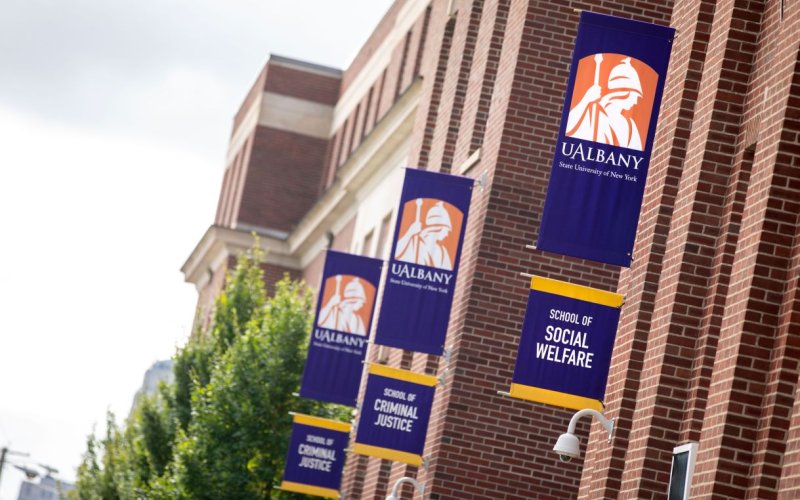School of Social Welfare Students Support Locals Experiencing Housing Insecurity

By Erin Frick
ALBANY, N.Y. (March 2, 2023) — Hundreds of people living in the Capital Region do not have permanent housing. While this number has begun to decline in recent years thanks to the work of local organizations working to provide shelter and secure homes, there remains a critical need to support this vulnerable population.
University at Albany Master of Social Work (MSW) students are partnering with local organizations to help fill the gap.
“Dedicated organizations throughout the Capital Region are answering the call to house, feed and clothe those who do not have ready access to these resources, saving lives in emergency situations,” said Lisa DeLaMater, assistant dean and director of field education at the School of Social Welfare. “They also do so much more. Mitigating homelessness and housing insecurity requires a holistic approach that is unique to every individual, involving assessment and response to multiple factors such as mental health, substance use, legal issues, employment preparation, spiritual journeys, social support and more. Students in UAlbany’s Master of Social Work program provide this nuanced work via field practicums in the local community.”
Increasing Exposure to Improve Care
As part of their first year of study, MSW students undertake a field practicum. Placements are arranged based on the needs of local partner organizations that are engaged in work aiming to address a variety of social and economic problems. These opportunities allow students to gain valuable career experience and build their social work skillsets while serving the community.
Heather Larkin is an associate professor at the School of Social Welfare, whose teaching and research focus on homeless populations and how they can be better served, starting with social work education.
“While there is a significant need for social workers with the skills to serve this population, only 1% of licensed clinical social workers work within homeless service agencies,” said Larkin. “This is due in part to a lack of exposure, which exacerbates misconceptions around homeless populations that impair efforts to support people in need. In addition to offering field practicums with local shelters, we also offer courses and research opportunities designed to educate students on the multifaceted nature of this issue and how they can help. We hope these opportunities will encourage more students to consider a career in this challenging and rewarding field.”
City Mission Wellness Center
Jessie Reiff and Jillian Tramontina are both first year MSW students who have been serving unhoused individuals at the City Mission of Schenectady’s new Wellness Center.
At the Wellness Center, Reiff helps connect residents and community members with services such as mental health, substance abuse and spiritual counseling, medication management and resources to support physical well-being through nutrition and exercise.
“At the City Mission’s Wellness Center, I conduct second-level intakes, which is when we gather information about incoming residents’ specific needs and help them navigate resources available at the Center,” Reiff said. “I engage with residents daily. This includes developing wellness plans, conducting one-on-one counseling sessions, attending medical appointments as an advocate and accompanying residents to housing interviews.
“Every day is different. We also serve non-resident members of the community, turning no one away that needs help. While many of the Mission residents have experienced abandonment or feel pushed aside by society, we are there to listen, serve and show them that we care. It is rewarding to be a part of a team that is actively fighting and advocating for them. We want to see people succeed and get ahead.”
In addition to strengthening her social work toolkit, Reiff explains how the experience has helped shape ideas for her future career:
“I have gained confidence working with diverse populations and I’m consistently challenged to adapt to whatever is thrown at me that day. Working one-on-one with residents to provide mental health counseling — merging my passion of holistic modalities and traditional psychotherapy — has furthered my interest in pursuing a micro concentration in my second year.”

Jillian Tramontina also conducts second-level intakes, assists with resource navigation and engages with Mission residents during one-on-one mental health counseling sessions.
“The most rewarding part of working at the shelter is getting to know the residents’ stories and being a part of their journey,” Tramontina said. “Many times, homeless individuals feel like they are invisible because so many people pass them by. I feel like I am making a difference by being someone constant and reliable in their lives.
“Through this experience, I have learned that change is challenging. Changing habits, overcoming addictions and building and repairing relationships all need consistent effort, and it takes a while to see progress. Working with the men and women in this program has shown me how resilient people can be, and I admire their desire to change and improve their lives. Seeing this impact has made me want to continue working in this field.”
845 Commons
Jennifer Emrich is also a first-year MSW student. Her first field practicum is at 845 Commons, an independent housing program that is part of the Capital District YMCA. Emrich explained that 845 Commons serves as an intermediary step between a shelter and a more permanent living arrangement. While residents do pay rent and can stay indefinitely, the goal of many is to find a home or apartment of their own.
“At 845 Commons, we help residents find permanent housing using a step-by-step approach that is different for each person we serve. This process includes logistical elements like assisting with paperwork and ensuring certain appointments are kept, as well as providing services like counseling, job searching and helping residents gain social and life skills needed to live on their own or harmoniously with others.
“The most valuable part of the work is getting to know the residents and learning about their struggles and goals. The work is challenging, but it is both humbling and rewarding when residents express relief, joy or gratitude for help with things like securing transportation, setting up doctor’s appointments, troubleshooting social services or accomplishing personal goals. Sometimes, simply being there to listen is enough to turn someone’s day around.
“Through this placement, I have gained a better sense of what I want to do, how I want to help others and how others want to be helped,” Emrich said. “I’ve honed skills that can be applied anywhere, to any population or individual in need. My hope is that this type of extra support can be the difference between someone who is merely coping and someone who is really thriving.”




